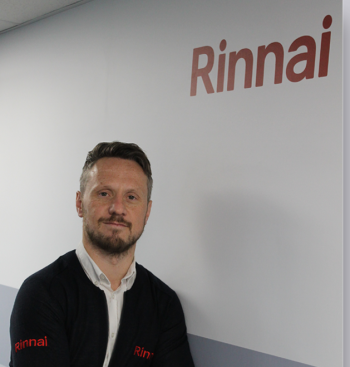We interview Chris Goggin, Director of Operations at Rinnai, about the company and its technology-agnostic approach to decarbonisation.
Q: For readers new to Rinnai, can you give us a brief company background?
A: Rinnai is a 104-year-old, family-owned manufacturer of hot water and heating technologies. Historically that meant gas appliances, but the group also builds water control tech and electric kit. Everything is vertically integrated – we make our own critical parts – so reliability and support are consistent across markets.
Q: How is the UK business set up today?
A: We have dedicated teams focussed in design, specification, service, install, maintenance, marketing, technical support and administration – plus an Applied Sales Division that designs solutions at relevant for the nuanced building stock. They look at the fabric, loads and site constraints, then recommend the best route: full electrification, hybrid or gas – based upon technical, practical and economic factors.
Q: Sum up your technology roadmap in simple terms.
A: We’re deliberately technology-agnostic. Our ‘three Hs’ frames it neatly: H1 is hydrogen and renewable liquid gases; H2 is hybrid – typically heat pumps working with gas or electric storage; H3 is all-electric heat pumps. Across H3 we offer units from 4 kW to 440 kW using refrigerants such as R290 and R32 – with more options coming.
Q: Why take an agnostic approach when policy pushes electrification?
A: Because buildings aren’t all the same. Newbuilds can be designed electric-first as we are seeing with the future Building Regulations – but the UK’s existing stock is wildly varied. We model capex, opex and carbon for each option so clients can choose what’s technically, practically and economically feasible for there building envelope and demand.
Q: Where does hydrogen and renewable gas fit – is that a bridge or a destination?
A: It could be both. We already have hydrogen-blend-ready products certified, along with technologies compatible with renewable liquid gases. For off-grid sites or places where grid upgrades are costly or slow, these fuels enable meaningful decarbonisation now, and create a path to deeper cuts later.
Q: What’s the biggest barrier you see in the UK market right now?
A: The skills gap. Many installers are brilliant on legacy systems but haven’t had the time or incentive to upskill. Our job is to meet them where they are, with options across gas, hybrid and electric – and back that up with training and design support so the transition feels practical, not painful.
Q: What are your plans for elementalLONDON?
A: Education before, during and after the show. We’re running CPDs on SPF, heat pump design and retrofit, plus an elemental-exclusive £200 bursary scheme for participants to support upskilling. On-stand, we’ll walk visitors through real-world system choices – full electric vs hybrid – complete with capex, opex and carbon comparisons and importantly SPF which takes the impact of the whole system into consideration.
Q: Final thought for anyone planning their decarbonisation pathway this year?
A: Don’t force a single technology into every building. Start with the envelope and the loads, test options using whole-system metrics, and keep an open mind. Our role is to give you credible choices – from H1 through H3 – with the data, training and support to make each choice work in the real world. Come find us at elemental and let’s map your best route together.
Come meet the Rinnai team at elementalLONDON, 19-20 November at Excel London. Register for your free ticket here.
